Elephants crossing a seemingly endless savannah, leopards relaxing in a balboa tree or hippos rolling in the mud can be seen in the wild in very few places. It’s the reason that an East African Safari is on the “bucket list” for so many of us.
National Parks and game reserves in Kenya, Uganda and Tanzania are teeming with wildlife often found nowhere else in the world, and each park has unique landscapes that can differ quite widely, even from each other.
In Swahili, one of the official languages in Tanzania, safari means “journey or trip” and was adopted as the universal term for excursions into National Parks to see wildlife in Africa.
The downside to the magical trip is the cost. There’s no doubt about it, safaris are expensive. But, for the amazing experience that can’t be duplicated anywhere else in the world, the price is worth it for many travellers and nature lovers.
Where to go and what you’ll see on an African safari
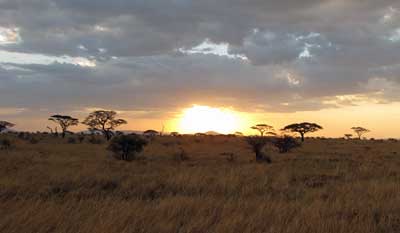
The most popular circuit joins both Tanzania and Kenya’s parks and allows travelers to experience a wide range of wildlife and scenery. It combines Kenya’s Masai Mara with Tanzania’s Serengeti and Ngorongoro Crater. Smaller parks in Tanzania can be joined to the journey easily as they border the Serengeti including Lake Manyara and Tarangire National Park.
Without fencing between them, the Masai Mara and Serengeti boast the world’s largest migration of animals with millions of zebra, wildebeest and gazelle all travelling together in a circular route that encompasses both parks as the animals follow the rains in search of good grazing.
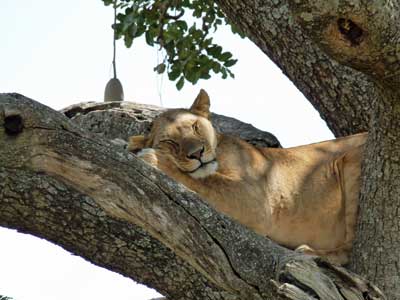
Ngorongoro Crater Conservation Area is one of the most compact wildlife viewing areas known to man. Formed from a volcanic crater, it is 600 meters deep and about 300 square kilometers in area.
It offers breathtaking views as you drive the steep road into the crater. The big five all reside in this conservation area, even the endangered rhinoceros. Flamingoes grace the salt lake and buffalo roam the open spaces.
A breakdown of safari costs
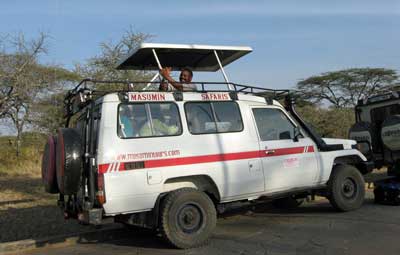
Tour guides will take care of all paperwork and payments during the trip which makes it much more relaxing for the safari goer.
Tourist Entry Fee: Each tourist that enters a National Park pays an entry fee for each 24-hour period in the park. When entering the park, tourists must state when they will exit and pay the appropriate fee before entering. These fees range from US$30 – $100 depending on the country and park being visited and are always for a 24-hour period.
Car Entry Fee: To maintain roads and the unique habitats of animals, parks also charge an entry fee for the vehicle. It may be as little as US$30 or as much as US$200 depending on which parks you are visiting. These fees are also for 24 hours.
Car and guide hire: Most companies include the cost of driver/guide as a package with the car hire. Cars should be a 4WD vehicle suitable for the terrain with roofs that can be opened for full viewing capabilities. Companies offer different amounts of luxury, experience and bonuses. Prices start at about US$350 per day and can be double or triple that cost for some of the luxury companies. Many companies put a cap on the number of kilometers (per day) that are allowed within that cost and excess travel will be added with steep rates. This is one of the more expensive areas of the safari price, but it’s worth it to go with a reputable company and pay the going rate.
Airport transfers: Depending on which park you’re going to, you may need to get from the airport to the city or park. Many safari companies will offer this service and will help to set up accommodation in the closest town before you set off on safari. Be sure to ask if this is included or if they can put it in the package.
Accommodation on safaris
There are a few options for accommodation when on a safari. Camping is, by far, the cheapest option if you don’t need a comfortable bed or hot water and rates are charged on a per person, per night basis.

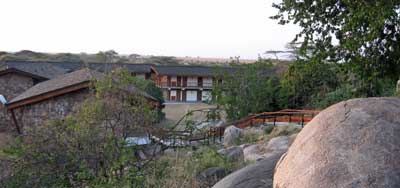
Prices for lodges differ greatly between high and low tourist seasons and also vary between countries and parks. Generally, you won’t find a lodge for less than US$200 for a double room, even in low season and as for a high price, the sky is the limit!
Unfortunately, there really isn’t anything in the middle so you’re either looking at roughing it, or enjoying luxury at luxury prices.
What about the “budget” safari option?
There are lots of explanations for the lack of budget options in the land of safaris but, the biggest reason is that thousands of tourists have been paying the prices asked for years. Why charge less when people pay the going rate?
The governments of Kenya, Uganda and Tanzania have set the fees for tourist and car entry fees and dictate, in large part, the amount that is charged for all types of accommodation as well. Safari companies themselves really control only the car and guide hire fees though they can recommend the lower end lodges when asked.
There are some ways to save money when looking at a safari, so don’t lose heart altogether!
Rough it by camping
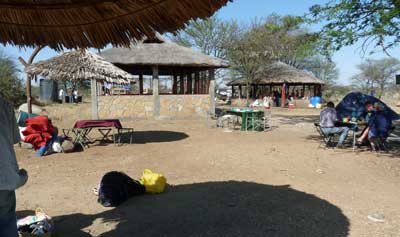
Each campsite has toilets and cold water showers, so although it’s not luxurious, it’s acceptable for many travelers. Most safari companies will provide tents, sleeping mats and chairs, so you don’t have to try to cram that equipment into your luggage allowance.
If you’re planning a multi-night safari, some choose to camp for the first few nights and enjoy the luxury of a lodge for the last part of the trip.
Go with a group
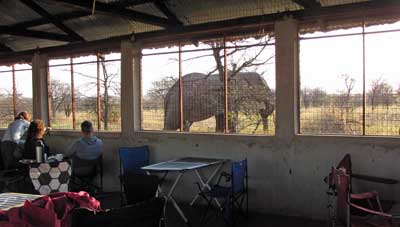
If you can’t handle the thought of camping with the lions, making sure there are an even number of people in the group will avoid single supplement costs which are steep in many parks.
Book once you are in country
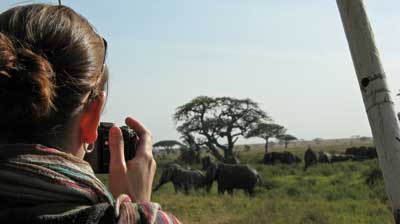
It is sometimes possible to negotiate slightly lower rates when you’re sat face to face with the owner of the company and there won’t be additional bank or credit card fees if you pay in cash.
When you book in country, some companies will also help to find you a group to go with to help to share the costs, but this is always completely dependent on having others who are welcome to the idea.
If you’re on a tight timeline, it’s not reasonable to do this. But, it’s often cheaper to deal with a company based in East Africa than to book through a company at home who acts as a middle man.
There are a variety of online forums where recent travellers can recommend good companies and give contact details. Do an online search for companies and then look at reviews of the company. Doing it this way will cut out the costs added by the middle company and can save you hundreds of dollars.
Travel in off-season
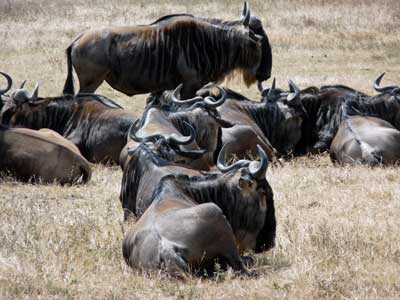
Because there aren’t as many tourists visiting, lodges may be as much as 50% off the high season price and safari companies may be willing to negotiate their rates slightly. International flights are often less expensive during low season as well which helps the overall cost.
Though not a financial incentive, low season also means that there will be fewer cars gathered around that lion or leopard that your guide has spotted which can be a huge draw for those of us who like nature to be as natural as possible.
Dangers and things to avoid when booking safaris
When booking a safari, it’s important to remember that if it seems to be too good to be true, it probably is. There are numerous scam artists both online and off that offer an unbelievably low safari price but don’t actually exist.
Booking with a reputable company that has received good reviews on travel sites, or from friends or acquaintances, may end up saving you thousands of dollars and endless headaches.
Drivers vs. guides
Reputable companies offer well trained guides who will shock you at their ability to spot lions lying in tall, blond grass or leopards lazing in a leafy tree.
These guides can answer questions about the different habits of animals, name and explain the mountains in the background and will literally make your trip.
Cheap companies are more likely to send you with a driver who may not be fluent in English and can’t find a cheetah even if it’s sitting on top of your car.
Companies without a backup plan
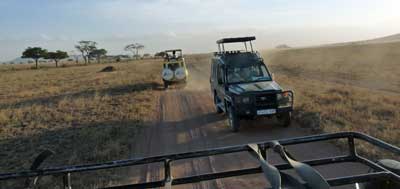
Independent car hire?
Self-drive safaris don’t really exist. Hiring a car from a local person is possible, normally for about US$200 a day, but companies won’t hire out a vehicle without a driver.
Self-drive isn’t really recommended due to the lack of reliable maps and signposts in the park and the nonexistence of road side assistance. Without a guide, the average person misses three quarters of the animals which is the reason that most of us go on safari after all.
If a company is telling you that they can reduce the park fees, run away as fast as you can. Equally, if they are offering a lodge for a quarter of the price you see online, don’t believe it. Most prices of a safari package are set in stone and can’t be negotiated, so if a company claims to be able to, they’re lying.
Don’t miss out
A safari in East Africa should be experienced by everyone at least once in a lifetime. Though they aren’t cheap, they offer an experience that can’t be replicated anywhere else in the world.
With some careful planning and research into companies, you’ll be able to see amazing wildlife in majestic scenery without hassle.
By Tara Vicars
Tara Vicars is a freelance writer who splits her time between Canada and Tanzania with frequent trips to other exciting countries around the globe. When she’s not traveling, she can be found in a kitchen attempting to recreate amazing dishes from recent adventures, or on Twitter @TaraVicars.

please provide me with a road safari to nairobi,tanzania and uganda,we have a group of 7.
your quick reply will be appreciated